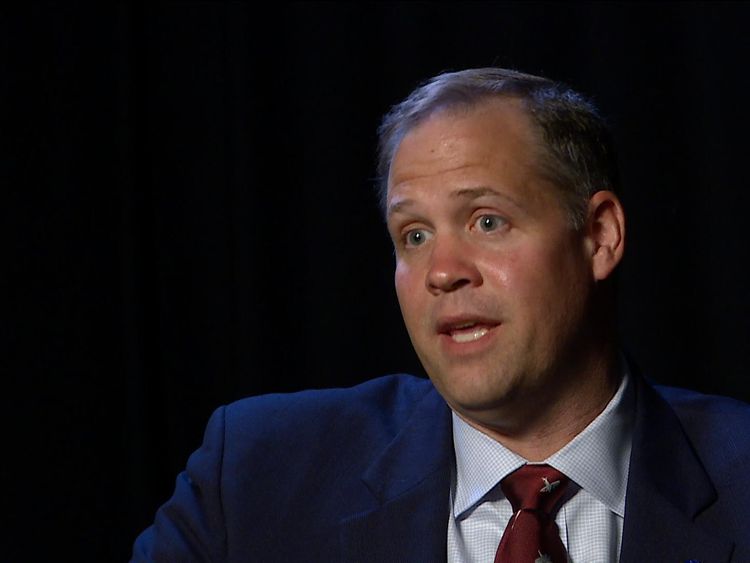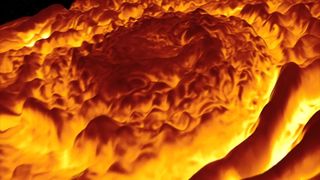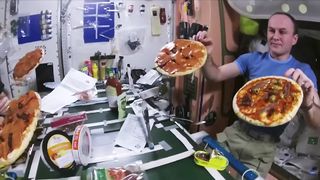NASA could one day launch satellites from Britain, the new space agency boss has told Sky News.
Jim Bridenstine, who was appointed as NASA's administrator by US president Donald Trump earlier this year, said the UK government's plans for new spaceports open new opportunities.
"We are thrilled about this.
"It's about what we are trying to launch, where do we want it to go in orbit and who can provide the best price.
"The UK and the US have a long partnership in space exploration," he added.
"I would see NASA putting satellites on top of a rocket that launches from the UK," he said.
Mr Bridenstine was a controversial appointment because his background is in politics, not space science.
He was also a climate change sceptic, but he said he now accepts that humans are "likely" to be the primary cause of a warming planet.

Mr Trump withdrew from the Paris Agreement on greenhouse gas reductions last year and Mr Bridenstine has yet to try to change the president's mind.
"I've never brought it up with him specifically," he said. "I've been on the job for nine weeks."
Mr Trump has made clear that human exploration of the solar system must be a priority for NASA.
 1:10
1:10The agency's new mega-rocket, the Space Launch System, will restart missions to the moon nearly 50 years after the last lunar landing.
"In the Apollo era, the purpose of getting there, it was about competition between the United States and the Soviet Union.
"We got there with footprints and flags.
"It was a great achievement," said Mr Bridenstine.
"But (President Trump) wants us to go to the moon in a sustainable way," he added.
"This time when we go, we stay."
 0:54
0:54The former Republican congressman is trying to gather international support for a space station, this time orbiting the moon. Reusable shuttles would take astronauts to and from the surface.
A mission to Mars will follow in the late 2030s.
The endeavour would mean NASA stepping back from missions closer to home.
Mr Trump has said the US will stop funding the International Space Station in 2025.
"Staying in low-Earth orbit for another 20 years using taxpayer funds is not his idea," Mr Bridenstine said.
More from NASA
"He wants the next big thing."
The NASA chief wants private companies to take over the running of the ISS. He said microgravity opens new commercial opportunities, such as 3D printing of human organs.
NASA could one day launch satellites from Britain, the new space agency boss has told Sky News.
Jim Bridenstine, who was appointed as NASA's administrator by US president Donald Trump earlier this year, said the UK government's plans for new spaceports open new opportunities.
"We are thrilled about this.
"It's about what we are trying to launch, where do we want it to go in orbit and who can provide the best price.
"The UK and the US have a long partnership in space exploration," he added.
"I would see NASA putting satellites on top of a rocket that launches from the UK," he said.
Mr Bridenstine was a controversial appointment because his background is in politics, not space science.
He was also a climate change sceptic, but he said he now accepts that humans are "likely" to be the primary cause of a warming planet.

Mr Trump withdrew from the Paris Agreement on greenhouse gas reductions last year and Mr Bridenstine has yet to try to change the president's mind.
"I've never brought it up with him specifically," he said. "I've been on the job for nine weeks."
Mr Trump has made clear that human exploration of the solar system must be a priority for NASA.
 1:10
1:10The agency's new mega-rocket, the Space Launch System, will restart missions to the moon nearly 50 years after the last lunar landing.
"In the Apollo era, the purpose of getting there, it was about competition between the United States and the Soviet Union.
"We got there with footprints and flags.
"It was a great achievement," said Mr Bridenstine.
"But (President Trump) wants us to go to the moon in a sustainable way," he added.
"This time when we go, we stay."
 0:54
0:54The former Republican congressman is trying to gather international support for a space station, this time orbiting the moon. Reusable shuttles would take astronauts to and from the surface.
A mission to Mars will follow in the late 2030s.
The endeavour would mean NASA stepping back from missions closer to home.
Mr Trump has said the US will stop funding the International Space Station in 2025.
"Staying in low-Earth orbit for another 20 years using taxpayer funds is not his idea," Mr Bridenstine said.
More from NASA
"He wants the next big thing."
The NASA chief wants private companies to take over the running of the ISS. He said microgravity opens new commercial opportunities, such as 3D printing of human organs.











